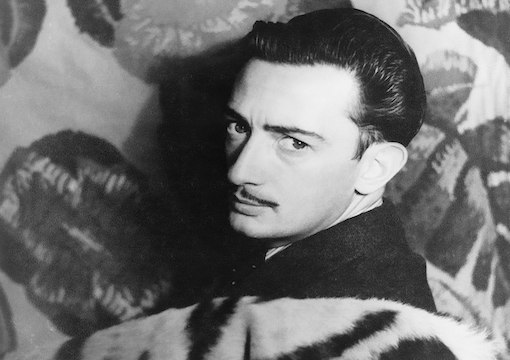
February 06, 2020

Salvador Dali
Source: Carl Van Vechten
“The Russian Revolution is the French Revolution which arrives late because of the cold weather,” said Salvador Dalí. His work was banned in the Soviet Union, but has great success in Russia today. In Moscow, the exhibition “Salvador Dalí: Magic Art” is having a massive influx of visitors, showing that the Russians love crazy people and need an artistic outlet for their punished subconscious.
Although Dalí himself already said: “The only difference between Dalí and a madman is that Dalí is not mad.” Stefan Zweig introduced him to Sigmund Freud in London. After a heavy discussion, the diagnosis of the psychoanalyst was that Dalí was the prototype of a Spanish fanatic. Both had brought the subconscious demons to light, and, of course, they did not understand each other.
The fact that Dalí’s muse and wife was Russian creates a lot of expectation in Moscow. Gala was a formidable person. It is said that she lost her virginity to the monk Rasputin and that, for the rest of her life, she maintained a great sexual appetite satisfied by legions of young lovers.
Dalí consented while he went to Madame Rius’ brothel in Barcelona. He sent for all the girls, who encircled him, and ordered a duck that he slaughtered in the climax of his sexual fantasy.
“Picasso is a genius, me too. Picasso is a communist, neither am I.” Dalí soon saw the totalitarian horror of communism and refused to smoke the opium of intellectuals. That earned him expulsion from André Breton’s surrealist group, the same one who claimed, “Persia, Persia; Greece is the big mistake!” Of course, Dalí said: “The difference between the surrealists and me, is that I am a surrealist.”
It was also Breton who gave Dalí the nickname of Avida Dollars, made with all the letters of his name. Dalí, much smarter, turned around by saying: “I don’t paint for money; I make money to paint.”
After a row “a la ampurdanesa,” Dalí broke relations with his father, a notary with great personality, who was scandalized by the behavior of his genius son. Dalí ejaculated onto a piece of paper and sent it by letter to his father with a message: “I return what I owe you.”
He was called the Great Masturbator, and there was much gossip about his impotence. Although he would taste homosexual love with the great poet Federico García Lorca. “Did you like the experience, Salvador?” Luis Buñuel asked maliciously. “Very painful!” replied the genius in his olive-oily voice.
Dalí wanted to turn life into a rite, giving style to every moment. For many he is an even better writer than painter. And those who knew him well say he had an overpowering personality and a great sense of humor, and was always generous with young artists. A true genius.
No wonder he inspires passions in Russia. Dalí’s revolution is one of pleasure!
(The article in its original Spanish immediately follows.)
Dalí en el Kremlin
“La revolución rusa es la revolución francesa que llega tarde, por culpa del frío,” opinaba Salvador Dalí. Su obra fue prohibida en la Unión Soviética, pero tiene gran éxito en la Rusia actual. En Moscú, la exposición Dalí: Arte Mágico, está teniendo una masiva afluencia de público que demuestra que los rusos aman a los locos y precisan de una salida artística a su castigado subconsciente.
Aunque el propio Dalí ya dijo: “La única diferencia entre Dalí y un loco, es que Dalí no está loco.” Stephan Zweig le presentó en Londres a Sigmund Freud. Tras una discusión, el diagnóstico del psicoanalista fue que Dalí era el prototipo de español fanático. Ambos habían sacado los demonios del subconsciente a la luz y, por supuesto, no se entendieron.
Que la musa de Dalí fuera rusa crea mucha expectación en Moscú. Gala era una mujer de armas tomar. Se cuenta que perdió la virginidad con el monje Rasputín y que, durante el resto de su vida, mantuvo un gran apetito sexual que satisfacía con jóvenes amantes.
Dalí lo consentía mientras se dirigía al burdel de la señora Rius, en Barcelona. Hacía salir a todas las chicas, que le hacían corro, y ordenaba un pato al que degollaba en el clímax de su fantasía sexual.
“Picasso es un genio, yo también. Picasso es comunista, yo tampoco.” Dalí vio pronto el horror totalitario del comunismo y se negó a fumar el opio de los intelectuales. Eso le valió la expulsión del grupo de surrealistas de Andre Breton, el mismo que clamaba “¡Persia, Persia; Grecia es el gran error!” Naturalmente el genio respondió: “La diferencia entre los surrealistas y Dalí es que Dalí es surrealista.”
También fue Breton el que puso a Dalí el apodo de Avida Dollars, con todas las letras de su nombre. Dalí, mucho más inteligente, le dio la vuelta diciendo: “Yo no pinto por dinero; yo hago dinero para poder pintar.”
Tras una bronca a la ampurdanesa, Dalí rompió relaciones con su padre, un notario de gran personalidad pero escandalizado por la conducta del genio. Dalí se hizo una paja corriéndose en un papel y lo mandó por carta a su progenitor con el mensaje: “Te devuelvo lo que te debo.”
Le llamaban el Gran Masturbador y había numerosos chismes sobre su impotencia. Aunque pudo probar el amor homosexual con el gran poeta Federico García Lorca. “¿Te gustó la experiencia, Salvador?” le preguntó con malicia Luis Buñuel. “¡Muy dolorosa!” respondió el genio con su voz aceitunada.
Dalí quiso convertir la vida en rito, dotando de estilo a cada instante. Para muchos es todavía mejor escritor que pintor. Y los que le trataron bien dicen que tenía una personalidad arrolladora, tremendo sentido del humor y gran generosidad con jóvenes artistas.
No me extraña que inspire pasiones en Rusia. ¡Dalí es una revolución de placer!